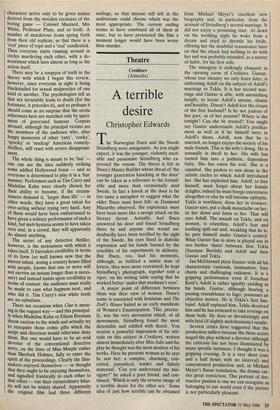Theatre
Creditors (Almeida) A terrible
desire
Christopher Edwards
The Norwegian Ibsen and the Swede Strindberg were antagonists. As you might expect, it was the younger, violently excit- able and passionate Strindberg who ex- pressed the venom. The threat is felt in Ibsen's Master Builder whose dread of 'the younger generation knocking at the door' can be taken as a reference to the formid- able and more than occasionally mad Swede. In fact a knock at the door is far too tame a metaphor to suggest what the older Ibsen must have felt; as Desmond Macarthy observed, the experience must have been more like a savage attack on his literary throat. Actually, had Ibsen answered his door and found Strindberg there he and anyone else would un- doubtedly have been terrified by the sight of the Swede, his eyes fixed in diabolic expression and his hands burned by the crucibles of his experiments in alchemy. But Ibsen, too, had his moments, although, as befitted a senior man of letters, they were more restrained; he kept Strindberg's photograph, together with a viper, on his writing table saying that he worked better 'under that madman's eyes'.
A major point of difference between them was their view of women. Ibsen's name is associated with feminism and The Doll's House hailed as an early manifesto of Women's Emancipation. This, precise- ly, was the very movement which, of all movements, Strindberg found the most detestable and riddled with deceit. You receive a powerful impression of his atti- tude on this subject in Creditors, written almost immediately after Miss Julie and the play he thought was the most modern of his works. Here he presents woman as he says he saw her: a vampire, charming, con- ceited, parasitical, tender and falsely maternal. 'Can you understand my mis- ogyny?' he asked a poet friend, and con- tinued, 'Which is only the reverse image of a terrible desire for the other sex.' Some idea of just how terrible can be obtained from Michael Meyer's excellent new biography and, in particular, from the account of Strindberg's second marriage. It did not enjoy a promising start. At dawn on the wedding night he woke from a dream and tried to throttle his bride, offering her the doubtful reassurance later on that the attack had nothing to do with her and was probably intended, as a matter of habit, for his first wife.
The misogyny is strikingly eloquent in the opening scene of Creditors. Gustav, whose true identity we only learn later, is addressing Adolf on the subject of Adolf's marriage to Tekla. It is her second mar- riage and Gustav is able, with astonishing insight, to locate Adolf's unease, shame and hostility. Doesn't Adolf fear the return of the first husband? Is he not jealous of her past, or of her present? Where is she tonight? Can she be trusted? You might say Gustav understands Adolf's predica- ment as well as if he himself were in Adolf's shoes. Adolf, now that he is married, no longer enjoys the society of his male friends. This is his wife's doing. He is sensually in thrall to her. His wife has turned him into a pathetic, dependent baby. She has eaten his soul. She is a cannibal. She prefers to mix alone in the artistic circles to which Adolf introduced her. She has exploited him. Adolf, to free himself, must forget about her female delights; indeed he must forego intercourse altogether or else he will become epileptic. Tekla is worthless; dress her in trousers, Gustav says, put a chalk moustache on her, sit her down and listen to her. That will cure Adolf. The assault on Tekla, and on women, is relentless. Adolf's fear and loathing spill out and, weakling that he is, he puts himself under Gustav's control. What Gustav has in store is played out in two further 'duets' between, first, Tekla (Suzanne Bertish) and Adolf and then Gustav and Tekla.
Ian McDiarmid plays Gustav with all his characteristic cynicism, insinuation, foxy charm and challenging rudeness. It is a gripping performance even if Jonathan Kent's Adolf is rather ignobly yielding in his hands. Gustav, although bearing a passing resemblance to lago, possesses an objective motive. He is Tekla's first hus- band. Adolf replaced him, Tekla deceived him and he has returned to take revenge on them both. He does so devastatingly and with fatal (if slightly melodramatic) results. Several critics have suggested that the production suffers because the three actors staged the play without a director although the criticism has not been illuminated by many specific instances. I thought it was a gripping evening. It is a very short (one and a half hours with no interval) and concentrated production and, in Michael Meyer's fluent translation, the drama car- ries great conviction. This portrait of des- tructive passion is one we can recognise as belonging to our world even if the picture is not particularly pleasant.


























































 Previous page
Previous page